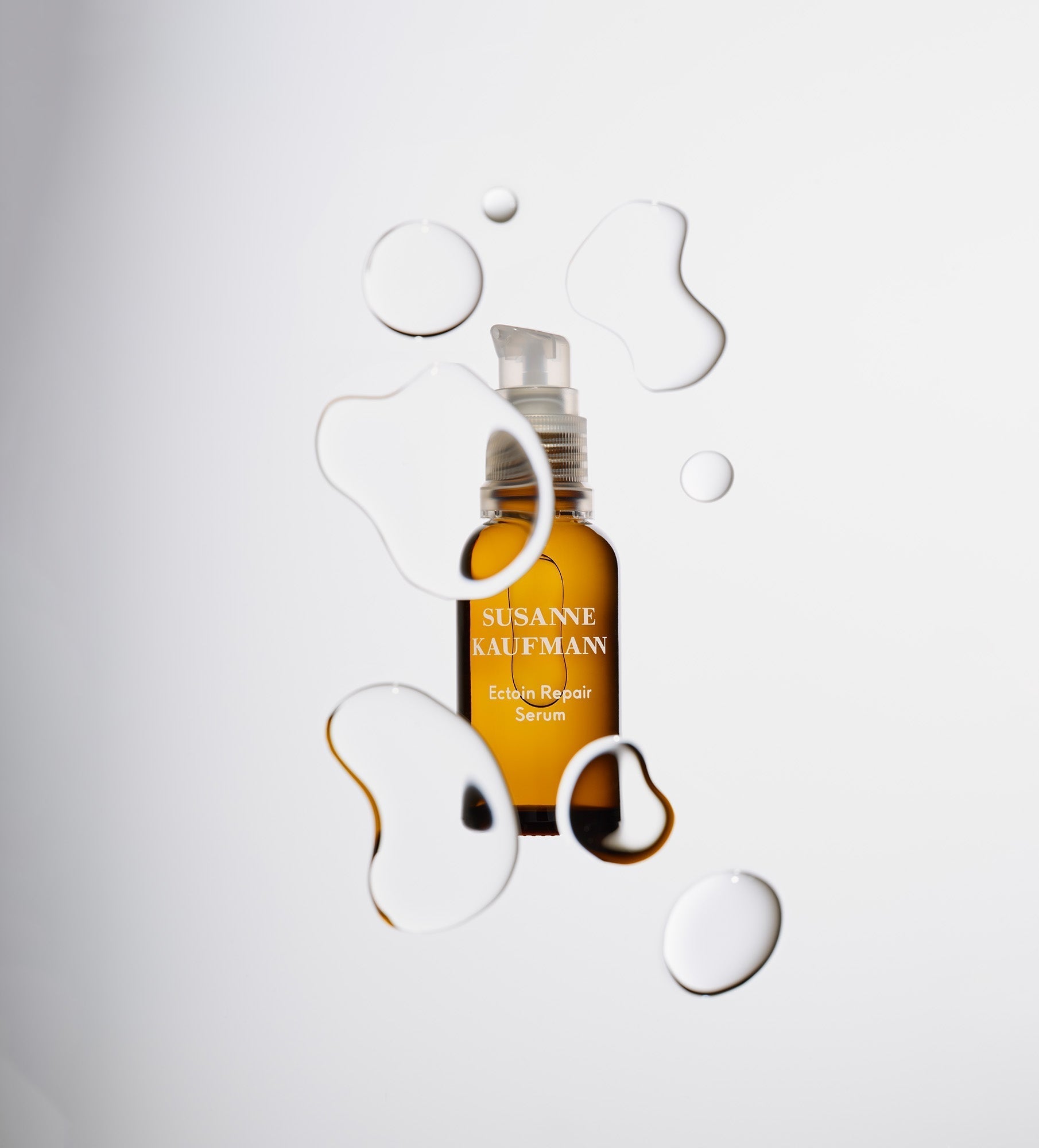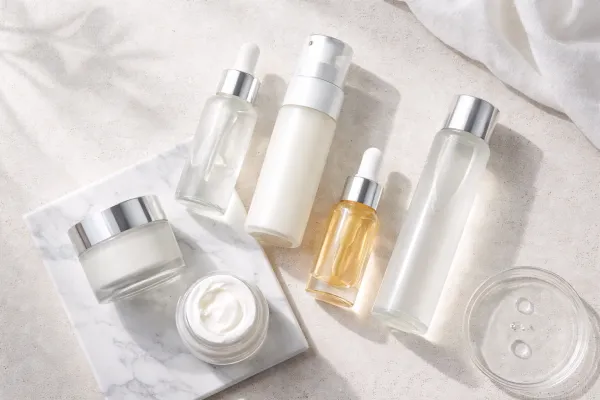What is the Skin Barrier and Why Is It Important?
Discover the secrets to a healthy skin barrier! Learn what it is, why it's crucial, and how to protect and repair it for radiant, youthful skin.

Let's talk about your skin barrier – what it is, why it's important, and how to keep it healthy.
You've probably heard the buzz about the skin barrier, and for good reason. In 2024, it's not just a trendy term, it's fundamental to understanding how to get healthy, radiant skin.
If you want your skin to look and feel its best, you have to understand this stuff.
Key Takeaways about the Skin Barrier
- Your skin's bodyguard: The skin barrier protects against external threats.
- Hydration hero: It keeps your skin moisturized and prevents water loss.
- More than just surface level: A healthy skin barrier contributes to overall skin health.
- Like bricks and mortar: The skin barrier is made of dead skin cells (bricks) and lipids (mortar).
- It's important: A damaged skin barrier can lead to various skin problems.
What is the Skin Barrier?
Understanding the Skin Barrier: Your Skin's First Line of Defense
Think of your skin barrier, also known as the stratum corneum, as your skin's personal bodyguard.
It's the outermost layer, the one that takes the hits from the outside world. This barrier is incredibly thin, but don't let that fool you – it's tough.
It shields you from all sorts of things, like pollution, bacteria, allergens, and even the sun's harmful UV rays. Without it, your skin would be vulnerable to all sorts of nasty stuff.
The Brick and Mortar Analogy: How the Skin Barrier Works

The skin barrier has a clever design, often described as a "brick and mortar" structure.
The "bricks" are corneocytes, which are dead skin cells. These cells are flat and stacked on top of each other, forming a tough, protective layer.
The "mortar" that holds these bricks together is a lipid matrix made up of ceramides, cholesterol, and free fatty acids. This matrix acts like a sealant, preventing moisture loss and keeping irritants out.
Key Functions of the Skin Barrier: Protection, Hydration, and More
The skin barrier is a multi-tasker. Its main job is protection, acting as a shield against environmental aggressors.
But it also plays a crucial role in hydration, preventing transepidermal water loss (TEWL). This means it keeps your skin from drying out by locking in moisture.
It also helps maintain the skin's slightly acidic pH, which is essential for overall skin health. A balanced pH helps keep bad bacteria at bay and supports the good bacteria that live on your skin.
What the Skin Barrier Is Made Of: The Building Blocks of Healthy Skin
The skin barrier isn't just bricks and mortar.
It also contains Natural Moisturizing Factors (NMFs), which are like tiny sponges that attract and hold onto water, keeping your skin plump and hydrated.
There are also proteins within the skin barrier that contribute to its structure and function. Think of them as the scaffolding that holds everything together.
The Importance of a Healthy Skin Barrier in 2024: Why It Matters Now More Than Ever
In 2024, with increasing environmental stressors and a growing awareness of skin health, a healthy skin barrier is more important than ever.
It's not just about looking good; it's about preventing skin problems. A damaged skin barrier can lead to dryness, irritation, inflammation, and even contribute to conditions like eczema and psoriasis.
Maintaining a healthy skin barrier can also help reduce the signs of aging, keeping your skin looking younger for longer.
Emerging Research on the Skin Barrier: The Gut-Skin Connection
Scientists are constantly learning more about the skin barrier, and recent research has highlighted the fascinating connection between the skin microbiome and the skin barrier.
The skin microbiome is the community of microorganisms that live on your skin. A healthy microbiome plays a vital role in maintaining a healthy skin barrier, and vice versa. This interplay is crucial for overall skin health.
Consumer Trends in Skin Barrier Health: The Rise of Barrier-Supporting Products
Consumers are becoming more educated about the importance of the skin barrier, and there's a growing demand for products that support its function.
People are willing to invest in skincare that protects and strengthens their skin barrier, recognizing its crucial role in achieving healthy, radiant skin.
How to Maintain a Healthy Skin Barrier: Practical Tips for Everyday Care
- Gentle Cleansing: Avoid harsh cleansers that strip away your skin's natural oils. Opt for a gentle, pH-balanced cleanser.
- Hydration is Key: Use a moisturizer that contains humectants like hyaluronic acid to draw moisture into the skin, and occlusives like ceramides to lock it in.
- Sun Protection: Apply a broad-spectrum sunscreen with an SPF of 30 or higher every day, even on cloudy days. Sun exposure can damage the skin barrier and lead to premature aging.
- Avoid Over-Exfoliating: Exfoliating can be beneficial, but too much can damage the skin barrier. Stick to exfoliating once or twice a week, and use a gentle exfoliant.
- Listen to Your Skin: Pay attention to how your skin feels. If it feels dry, tight, or irritated, it might be a sign that your skin barrier is compromised. Adjust your skincare routine accordingly.
Signs of a Damaged Skin Barrier: Recognizing the Red Flags
A damaged skin barrier can manifest in several ways, including:
- Dryness and flakiness
- Itchiness and irritation
- Redness and inflammation
- Increased sensitivity
- Breakouts
- Rough texture
- Tightness
- Burning sensation
- Infections
- Delayed wound healing
Repairing a Damaged Skin Barrier: Restoring Your Skin's Protective Shield

If you suspect your skin barrier is damaged, don't panic.
You can take steps to repair it. First, simplify your skincare routine. Cut back on harsh products and focus on gentle cleansing and moisturizing.
Look for products containing ceramides, niacinamide, and hyaluronic acid, which can help restore the skin barrier's function. Be patient; it takes time for the skin barrier to repair itself.
Skin Barrier: Tips, Tricks & Advice
1. Cleanse with Care
Use a gentle, pH-balanced cleanser to avoid stripping your skin of natural oils. Look for products with hydrating ingredients like glycerin or hyaluronic acid.
2. Lock in Moisture
Moisturize immediately after washing your face to trap moisture. Choose creams rich in ceramides, fatty acids, and cholesterol to repair and strengthen your barrier.
3. Protect with Sunscreen
Always wear a broad-spectrum sunscreen with SPF 30 or higher, even on cloudy days. This shields your barrier from harmful UV rays and prevents premature aging.
4. Avoid Over-Exfoliating
Exfoliate sparingly, 1-2 times per week, and avoid harsh scrubs or strong acids if your skin feels sensitive. Opt for mild exfoliants like lactic acid for gentle renewal.
5. Keep Your Routine Simple
Simplify your skincare routine to avoid overwhelming your skin. Focus on cleansing, moisturizing, and protecting. Avoid layering too many active ingredients at once.
6. Stay Hydrated
Drinking plenty of water keeps your skin hydrated from the inside out. Pair this with a diet rich in antioxidants and omega-3 fatty acids to support skin health.
7. Limit Hot Showers
Hot water can strip your skin of its natural oils. Opt for lukewarm water when washing your face or showering to preserve your skin barrier.
8. Watch for Irritants
Avoid skincare products with fragrances, alcohol, or harsh preservatives. These can disrupt the balance of your skin barrier and lead to irritation.
9. Be Patient
Repairing a damaged skin barrier takes time. Stick to a consistent, gentle routine and give your skin several weeks to heal and restore balance.
10. Consult a Dermatologist
If your skin remains irritated or sensitive, consult a dermatologist. They can recommend specialized products or treatments tailored to your needs.
The Skin Barrier and Different Skin Types: Tailoring Your Approach
Different skin types have different needs when it comes to maintaining a healthy skin barrier.
If you have dry skin, focus on rich, hydrating moisturizers. If you have oily skin, choose lightweight, oil-free moisturizers. If you have sensitive skin, opt for fragrance-free and hypoallergenic products.
The Long-Term Benefits of a Healthy Skin Barrier: Investing in Your Skin's Future
Maintaining a healthy skin barrier is an investment in your skin's future.
It's not just about addressing current skin concerns; it's about preventing future problems and maintaining healthy, youthful-looking skin for years to come.
Conclusion: The Skin Barrier – Your Skin's Unsung Hero
The skin barrier is often overlooked, but it's a crucial component of healthy skin.
Understanding its function and how to care for it can make a world of difference in your skin's appearance and overall health.
By following a simple, consistent skincare routine that focuses on gentle cleansing, hydration, and sun protection, you can keep your skin barrier strong and resilient, ensuring healthy, radiant skin for years to come.
Frequently Asked Questions
Can I repair a damaged skin barrier?
Yes, absolutely! By simplifying your routine, using gentle products, and incorporating barrier-supporting ingredients, you can help your skin barrier recover. To repair a compromised skin barrier: Use products with ceramides and fatty acids to rebuild the barrier, Apply a hydrating moisturizer to lock in moisture, Avoid over-exfoliating to prevent further skin damage, Stick to a simple, gentle routine until your barrier heals. Your skin barrier is like a shield—treat it with care. Follow these simple steps: Cleanse: Use a gentle, pH-balanced, sulfate-free cleanser, Hydrate: Apply a hyaluronic acid serum to damp skin, Repair: Use a moisturizer with ceramides, fatty acids, and cholesterol in a 1:1:1 ratio, Protect: Apply a broad-spectrum sunscreen with at least SPF 30 daily.
How long does it take to repair a damaged skin barrier?
It can take several weeks or even months for the skin barrier to fully repair itself. Be patient and consistent with your skincare routine. It depends on the severity of the damage and the individual, but with consistent use of barrier-repairing products and gentle skincare practices, you can typically see improvements within 2-6 weeks. Remember, skin barrier repair is a marathon, not a sprint. Be patient and persistent, and you'll reap the rewards. Results can vary depending on the severity of the barrier damage and the specific product used. Some people may notice improvements within days, while others may take several weeks.
What are the best ingredients for a healthy skin barrier?
Ceramides, hyaluronic acid, and niacinamide are excellent choices for supporting skin barrier function. Ceramides are like the mortar between the bricks (skin cells) of your skin barrier. They're essential lipids that help maintain the barrier's structure and prevent moisture loss. Hyaluronic acid (HA) is a humectant, meaning it attracts and holds onto water like a magnet. It can hold up to 1000 times its weight in water! This makes it a powerhouse for hydrating sensitive skin without clogging pores or causing irritation. Niacinamide, also known as vitamin B3, is a true multi-tasker for sensitive skin. It helps boost the skin's natural production of ceramides, strengthens the skin barrier, reduces redness and inflammation, and even helps regulate oil production. What's the Difference Between Hydration and Moisturization, and Why Do I Need Both? Hydration is about increasing the water content of your skin, while moisturization is about preventing that water from escaping. Think of it like this: hydration is like filling a bucket with water, and moisturization is like putting a lid on it to keep the water from evaporating. Hyaluronic acid is a great hydrator, while ceramides, fatty acids, and occlusive ingredients like shea butter and dimethicone help to moisturize and seal in that hydration. You need both for optimal skin barrier repair.
How often should I exfoliate if I have a damaged skin barrier?
If your skin barrier is compromised, cut back on exfoliating or avoid it altogether until your skin recovers. Avoid exfoliating until your barrier is repaired, as it can worsen the damage. Harsh exfoliating, whether with physical scrubs or chemical exfoliants, can strip away the skin barrier, leading to dryness, irritation, and increased sensitivity. It's like taking a sandblaster to your skin's protective wall. Exfoliate gently and in moderation, no more than 1-2 times per week. Absolutely! Over-exfoliating, whether with physical scrubs or chemical exfoliants, can strip away the skin barrier, leading to dryness, irritation, and increased sensitivity. It's like taking a sandblaster to your skin's protective wall. Exfoliate gently and in moderation, no more than 1-2 times per week.
Can diet affect my skin barrier?
Yes, a healthy diet rich in antioxidants, healthy fats, and vitamins can support overall skin health, including the skin barrier. While your diet won't directly alter your skin's pH, it can impact your overall health, which in turn affects your skin. A balanced diet rich in antioxidants, vitamins, and essential fatty acids supports healthy skin function. Staying hydrated by drinking plenty of water is also crucial. Besides using the right moisturizer, several lifestyle factors can support barrier repair: Healthy Diet: Eat a balanced diet rich in omega-3 fatty acids, Hydration: Drink plenty of water. A diet rich in whole, healthy foods provides your skin with the nutrients it needs to repair itself. Conversely, a diet high in processed foods, sugar, and unhealthy fats can contribute to inflammation and weaken your skin barrier. Your lifestyle choices can make or break your skin barrier.
Check out these external resources for more information








